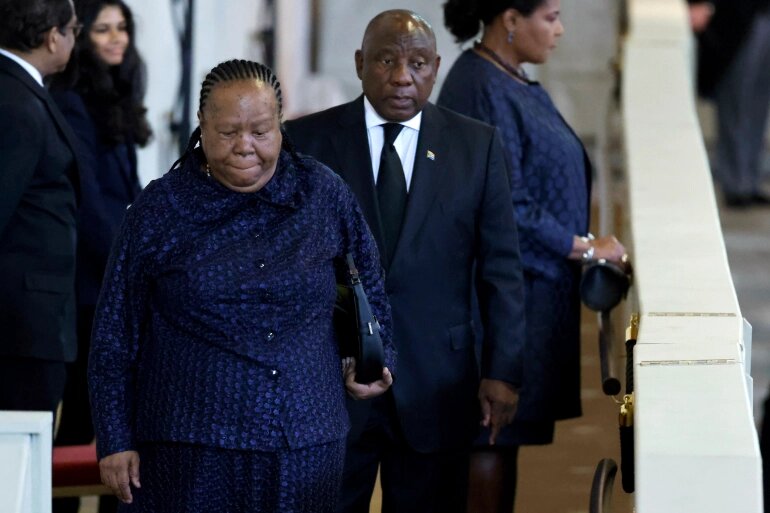The departure of Queen Elizabeth should motivate us to reflect on our own contributions to colonial heritage preservation.
Exploring the often-ignored, horrific history of British colonialism—the tale of the nation’s deadly subjugation and looting of communities around the world—and the role of the royal family in it—has been made much easier by the death and funeral of Britain’s Queen Elizabeth II.
It was encouraging to see so many people resist being forced to lament the loss of what was arguably the most prominent emblem of that history. I couldn’t help but notice a sizable gap, though.
While their citizens appeared eager to draw attention to previous misdeeds committed by the British, the current rulers of former British colonies lacked this enthusiasm. In reality, they all united in honoring Elizabeth II, displaying the flags at half-mast, praising her for her commitment to duty, and even coming to London in droves to attend the funeral.
It’s amazing how little was said about how that history is being played out in the present despite all the exhumations of the past. Because the truth is that, decades after their so-called “independence,” many of us continue to be surrounded by reminders of the British and Europeans’ exploitation of what they perceived to be their colonial property.
A week prior to the queen’s passing, the Supreme Court of Kenya had started hearing appeals of William Ruto’s victory in the August 9 presidential election. The wigs and robes that the attorneys and judges donned, as well as the formal way of addressing people—My Lords and My Ladies—are all customs that were imported from Mother England.
Political independence did not necessarily equate to decolonization for many former colonies. The Present as History: Critical Perspectives on Global Power by Nermeen Shaikh quotes political scientist and anthropologist Partha Chatterjee as saying that “many of the postcolonial state forms… copied rather purposefully the forms of the modern state in the West.”
There have, of course, been exceptions, like Thomas Sankara in Burkina Faso, who saw decolonization as a revolutionary, experimental process focused on the intellectual freedom of common people who would then be in charge of their own empowerment.
However, historians like Mahmood Mamdani have suggested that rather than decolonization, post-independence leaders, particularly in Africa, concentrated on deracialization, which is the process of eradicating white dominance through Africanization and nationalization. Deracialization was the first step in decolonization everywhere, he once observed.
Sadly, local elites never sought out further decolonization once they had obtained the benefits, opportunities, and resources that were previously only available to those of European descent. As a result, because the umbilical connections to colonial-era systems and practices had not been severed, so-called independent national governments became open to pressure and influence from foreign interests.
Many liberators did, in fact, wind up behaving exactly like the pigs in George Orwell’s Animal Farm and keeping or re-creating the colonial systems they had formerly decried. According to former Attorney General Githu Muigai’s account in a 1992 paper, the attempt to impose a liberal constitution on the authoritarian colonial administrative structure in Kenya at the time of independence failed because the former instead adapted to the latter rather than the other way around.
Recently, Ruto and Uhuru Kenyatta, his previous boss and predecessor as president, have been tasked with implementing a new constitution, promulgated in 2010, on the existing authoritarian colonial state. However, they have largely retreated from that.
In his second and final term, Uhuru even attempted to make revisions intended to undermine the restrictions on corruption, a return to what his father, the first post-independence president, Jomo Kenyatta, did to the new constitution at the time of independence. These amendments, which were ultimately overturned by the highest court in the nation, aimed to increase the number of state positions that could be shared among partners, including the positions of president, vice presidents, prime minister, and deputy prime ministers as well as the recognized leader of the opposition. Of course, this would have brought back the associated chances to plunder the Treasury that were there before 2010.
Therefore, it is abundantly obvious that even the most recent generation of rulers, which took over colonial governments largely intact, views old European colonizers as political relatives.
Elizabeth II’s passing offers a chance to do much more than simply discuss the past. Additionally, it should spur a long overdue self-examination to recognize our own contribution to upholding the colonial legacy we received from Europe and to restart the decolonization effort that was shelved at independence.
Such a discussion does not aim to return to pre-colonial times. It is a discussion “about whether a different modernity is feasible,” as Chatterjee pointed out. Even Western countries, who appear to struggle to define themselves outside of imperialism’s frameworks that had elevated them to the top of the heap, would gain from this discussion.
We wouldn’t be starting from scratch, of course. The foundation for the enormous task of cleaning up the political, social, economic, and cultural mess left behind by people like Elizabeth II has been created by a number of intellectuals and authors working outside of Western paradigms, from Frantz Fanon to Ngugi wa Thiong’o.
To achieve this, we must address the past’s influence in the present as well as remember it. Dealing with our own failure to create “a different modernity” after independence is necessary.
The views expressed in this article are the author’s own and do not necessarily reflect AdvertAfrica’s editorial stance.





